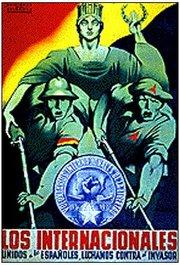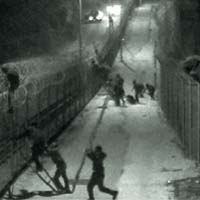
In Thailand there is another war against the civilized world being waged by our Muslim cousins. They just don't stop. Perhaps they can't. Maybe the poison of Islam is so deadly that there's nothing for them to do but die. Below we have three pieces culled from the press by agonist.org on the recent butchery of Thai military men by Muslims men protected by Muslim women villagers who prevented Thai police from saving their comrades. Following that is an abridged piece from a U.S. military writer on the history and current situation in Thailand.
We lead this post with a short excerpt from wikipedia on the International Brigades of the Spanish Civil War. It is our position that as there is considered to be one united ummah, one nation of true believers in Islam, so too must there be one united effort to combat Islam, to beat it to the ground, and to exterminate it forever. We include the note on the International Brigade as evidence that such things can be done. The following pieces on Thailand's Muslim insurgency show that we must do something to stop it, if not in Thailand, elsewhere. Thailand serves as an example of a territory outside the bounds of law regarding those who are not Thai. It's a clear algebraic example of the unknown factor being obvious once it is known.
We don't, of course, advocate that anyone would go to Thailand to engage in mercenary activities. Our point here is in conjunction with earlier posts that in the world of illegitimate law one need not obey the law. Mercenaries in foreign lands are still mercenaries, regardless of the purity of their souls. They still have no legal protection as soldiers. But then, if one were to engage an enemy that has no regard for the conventions of war it shouldn't come as any surprise to find that one is treated poorly regardless of ones legal position as an enemy combatant. The only point of interest here is that one must, prudentially, remain out of the bounds of criminality within the laws of ones own national legitimate law.
***International Brigades
From Wikipedia, the free encyclopedia.
The International Brigades were units created of volunteers and mercenaries who travelled to Spain to fight against the "Nationalist" forces led by General Francisco Franco and helped by Nazi German and fascist Italian forces, and defend the legitimate Spanish Republic government in the Spanish Civil War between 1936 and 1939.
40,000 men and women were enrolled in the Brigades. As many as 10,000 of them never returned. 50 nationalities were represented in the Brigades (during the Battle of Madrid, the XIIth Brigade counted representatives from no fewer than 17 nationalities in its ranks)
***
http://agonist.org/story/2005/9/22/195252/843
Insurgents plunge Thailand into security crisis
Jan McGirk | Bangkok | Sept 23 The Independent - The south of Thailand has been thrown into a security crisis after two marines were roped together, then beaten and hacked to death by a mob that accused them of being part of an undercover death squad.
The Prime Minister, Thaksin Shinawatra, vowed to track down their killers. Analysts said the incident could lead to a further escalation in a separatist insurgency in provinces with a Muslim majority, which has killed more than 1,000 people over the past 21 months. There were fears the violence could spill over into tourist areas such as Pattaya and Phuket. Malaysia placed security forces on alert along its northern border to prevent any spillover of the violence. Muslim rubber-tappers and labourers expressed fear of reprisal killings.
***
At least 500 villagers had surrounded Sub-Lieutenant Vinai Nabut and Petty Officer Khamthon Thongeiat as they were pulled from an unmarked car moments after a fatal shooting at a local teashop. Four other customers were wounded in this attack, which reminded villagers of an attack in June in which the cleric of the local mosque was hit. Before dying, he identified his assailants as government agents in plain clothes. Hundreds of women with small children blockaded the road into Tanyonglimo village in Narwathiwat province, and prevented the rescue of the marines during a 19-hour stand-off that ended on Wednesday afternoon.
Officials insisted that the armed marines, although out of uniform, were pursuing intelligence leads and were not part of any death squad. "It was a coincidence that the two marines came when the shooting happened," Thammarak Issrangkura Na Ayutthaya, the Defence Minister, said. Some reports said their car had stalled in the crowd.
The village headman, Romoeli Tingi, said relatives of the tea shop shooting victims did not believe the marines had fired the shots, and had planned to let them go. After the marines were tied up, they were given water and food, and villagers demanded Malaysian reporters who could understand their dialect be summoned.
By the time the reporters arrived, negotiations no longer were possible. Later, Mr Romoeli complained that milling crowds of outsiders may have provoked the killings. "More than half of them were not from this village," he said. Witnesses said that while elders left to pray in the mosque next door, three hooded militants rushed in to stab the marines, then bludgeoned them with a sledgehammer and iron staves.
more at link Insurgents plunge Thailand into security crisis
***
Fri Sep 23rd, 2005 at 09:32:23 AM PDT (none / 0) #1
candy (User Info)
Muslim women, children shield marine killers
Sep 24, 2005
Muslim women, children shield marine killers
By Richard S Ehrlich
BANGKOK - Suspected Islamist insurgents avoided capture after torturing to death two Thai marines by beating and stabbing the bound-and-gagged victims behind a human shield of defiant Muslim women and children, horrifying the government and plunging southern Thailand into a fresh security crisis.
Amid the world's most violent Islamist insurgency outside Iraq, angry and confused security forces hunted the elusive killers, described as three or four young men who ran away, leaving the marines' bloodied bodies in Tanyong Limo village.
"They were brutally beaten to death with machetes and sticks, while their hands and legs were tied up, and they were gagged and blindfolded," Lieutenant General Kwanchart Klaharn, commander of the Fourth Army and director of the Southern Border Provinces Peace-building Command, told reporters.
The bodies were locked inside a building near a mosque, prompting security forces to break down a door to gain access before transporting them to a hospital morgue, he said.
The brutality of the killings - coupled with the security forces' failed attempt to negotiate a peaceful resolution to the hostage crisis and the inability of the armed marines to defend themselves - was urgently being examined by politicians, peace activists, army generals and the Thai media.
"We will absolutely not let those two die for nothing. The law is the law," an agitated Prime Minister Thaksin Shinawatra told journalists after the killings Wednesday during a 19-hour stalemate between troops and villagers in violence-torn Narathiwat province.
"If I could, I would drop napalm bombs all over that village," a distraught Captain Traikwan Krairiksh was quoted in the Bangkok Post as saying after he viewed the bodies of his former subordinates in a pool of blood. "But the fact is, I can never do that. We are soldiers. We must follow the law. We can only take revenge by using the law."
Throughout the stand-off, scores of shouting Muslim women dressed in traditional headscarves stood with children, blocking troops from gaining access to the hostages, and erecting banners that blamed the authorities, including one in Thai that read: "You are in fact the terrorists."
Apparently hoping for a peaceful solution, troops did not attempt a forced rescue. The two experienced marines, armed with a US-supplied M-16 assault rifle and two pistols, were initially captured on Tuesday night when they stopped their vehicle near the village.
Locals blamed them for the drive-by shooting death of two men dining at a nearby tea shop earlier in the night, but authorities later explained that the marines were pursuing the unidentified killers and were simply in the wrong place at the wrong time.
More than 1,000 people on all sides have died in southern Thailand since January 4, 2004 when the smoldering rebellion flared in a so-called "night of the fires" attack on security forces, including synchronized arson assaults on 21 schools and a massive raid on a military base that netted the rebels hundreds of guns and heavy weapons.
Today, about 100 years after Thailand annexed the mostly ethnic Malay Muslim region, "mujahideen" holy warriors yearn for a separate state ruled by Islamic sharia law in a lush, tropical region where Islamists are waging similar insurgencies in the Philippines, Indonesia and elsewhere.
No one is sure who leads the increasingly sophisticated, disciplined and successful Muslim fighters in southern Thailand. The government blames indigenous rebel groups, allied with local Islamic schools, that are inspired by wars in Iraq and Afghanistan and by Osama bin Laden's call to force non-believers from Muslim territories.
http://www.atimes.com/atimes/Southeast_Asia/GI24Ae01.html
***
Following is a lengthy essay by a military writer on Thailand's Mulsim insurgency. We have abridged it severely, but the whole piece is worth the time to read in its entirety.
***
http://www.ccc.nps.navy.mil/si/2005/Feb/croissantfeb05.asp Unrest in South Thailand: Contours, Causes, and Consequences Since 2001
Strategic Insights, Volume IV, Issue 2 (February 2005)
by Aurel Croissant
Strategic Insights
Center for Contemporary Conflict
Naval Postgraduate School in Monterey, California.
Introduction
Historically speaking, Thailand is no stranger to armed conflict. Between the 1960s and early 1980s, the government fought an armed communist insurgency. Muslim separatists were active in the southern region of the country from the 1940s until the late 1980s. At the end of the 1990s, however, it seemed the Kingdom had solved its insurgency problem. The communist movement was dissolved and terrorism and political violence in the southern provinces was waning. In the past three years, however, southern Thailand has seen a recrudescence of long-dormant Malay-Muslim anger against the central government. The internal security situation in the country's southernmost provinces has rapidly worsened and worries are arising that the country will become another hotspot of Islamist terrorism in Southeast Asia.
This raises some critical questions: What is the conflict about? Why is violence rising? Who is behind the violence? How can Thailand counter this new wave of insurgency? What are the consequences for domestic politics?
This paper will discuss these questions. Section I describes the historical roots and the patterns of the conflict in Thailand's south until the late 1990s. Section II provides an outline of the current wave of insurgency. Section III examines causes for the latest outburst of violence. And Section IV discusses options for viable conflict solutions and the possible consequences for democracy in Thailand.
I. Historical Roots
Muslims comprise 5.5% of Thailand's population.[1] Notwithstanding its relatively small size, the relationship between the Buddhist majority of the population and the government in Bangkok and particularly the Malay-Muslim minority in the southern region is of crucial importance for political stability and security in Thailand and Southeast Asia. While Muslim communities exist all over the country, by far the greatest number of Muslims living in Thailand, however, is of Malay ethnic origin. As the only Muslim population in the country, they share a common ethnic identity and form a locally concentrated minority in the Patani Raya region,[2] which had been an independent Kingdom until 1786 when Patani was conquered by the King of Siam and the Muslim dynasty was abolished.[3] The efforts of the Siamese government to subjugate the Muslim areas began immediate after its incorporation but became more hostile only after the Anglo-Siamese treaties of 1904 and 1909 which recognized the Siamese control over Pattani.[4]
With King Chulalonkorn's administrative reforms in the 1890s, the Kingdom developed a centralized bureaucracy and established central control over most of its territory. Doing so, the central government in Bangkok was strong enough that it did not have to cut autonomy deals with the local Muslim rulers. Rather, the government eliminated local elites as a politically relevant player, as governors and bureaucrats were sent from Bangkok down to the southern provinces.[5] The government divided Pattani into seven provinces which were governed by appointed bureaucrats under a centralized administrative structure.
Thailand's southern region

Source: http://flagspot.net/flags/th(s.html.
From the late nineteenth century on, the royal government developed a policy of nation-building from above, which forced the transformation of the multi-ethnic society of Siam into a unified Thai nation. In the south, however, Bangkok managed dissidence mostly by leaving the Muslims alone. This laissez faire policy changed shortly before and during World War Two when the country saw an acceleration of political efforts to assimilate the southern population.[6] When the ultranationalist regime of Phibun came to power in 1938, it followed a policy of enforced assimilation of the various minorities cultures into the mainstream Buddhist "Thai-ness"[7] in order to develop, in David Brown's version, "the mono-ethnic character of the state."[ 8] In the 1940s, this provoked the emergence of a separatist movement fighting for an independent Pattani. In 1948, the Gabungan Melayu Patani Raya (Union of Malay for a Great Patani) was founded in 1948. Following the setting up of the Barisan National Pembebasan Patani (BNPP) in 1963, violent clashes between insurgents and the security forces were the rule in the southernmost provinces.[9] In the mid-1970s more than 20 separatist organizations agitated on both sides of the Thai-Malaysian border.
In the 1980s and 1990s, however, the situation changed. The new government under General Prem (1980-88) stopped the assimilation policy; instead, it supported Muslim cultural rights and religious freedoms, offered the guerilla a general amnesty, and implemented an economic development plan for the south.[10] In the 1990s, the democratic government formulated a new "National Security Policy for the Southern Border Provinces" based on a "development as security" approach, which was supposed to be implemented during 1999-2003.[11] Deepened cooperation between the Thai and Malaysian authorities improved security along the borderland, which contributed to the decline of the insurgency movement as well.[12] Most observers described it, thus, as "waning" and "relatively quit" at the late 1990s.[ 13]
II. The Recent Drift Towards Militancy
Even though Thailand's south contains fourteen provinces, the great majority of Thailand's Muslims live in the four southernmost provinces of Satun, Pattani, Yala, and Narathiwat. A recent household survey conducted by the Thai government found that over 76 per cent of the population in these four provinces adhered to the Islamic faith.[14] These provinces are also hotspots of recent violence and insurgency, accounting for most clashes and violent incidences in the current wave of unrest.
***
Escalating Violence
The latest outburst of violence started in 2001. While in the years 1993-2000, there were only a few incidents of separatist violence, accounting only for a handful of casualties, Ministry of the Interior statistics show and increase of violence from 2001 on. In 2001 alone, 19 killed policemen and 50 insurgency-related incidents across the three most affected provinces of Pattani, Yala and Narathiwat. In 2002, several police stations were attacked when the guerillas seized huge amounts of arms and ammunitions and killed some 50 police and soldiers in 75 incidents throughout the year. In 2003 official sources counted 119 incidents. The latest outburst of violence began on January 2004 when about 30 armed men stormed the army depot in Narathiwat, stealing 300 weapons and killing four Thai soldiers. During the ten months between January and end of October 2004, over 500 people reportedly have been killed in more than 900 insurgency-related incidents, including civilians, police, soldiers, and other government officials.[15] On October 25, 2004, the death of 84 Muslims at the provincial town of Tak Bai, once again elevated the conflict.[ 16] Recent killings in Songkhla[17] raise fears that violence could spill over into neighboring areas
The recent assassination of a private Islamic school teacher and the wounding of four others in gun attacks in Pattani and Yala raise concerns that members of the security forces or local village defensemen could adopt the insurgents' tactics to pay personal bills and to spread counter-violence.[18] Separately, some 20,000 members of the notorious right-wing Village Scouts organization rallied in November 2004 to prove their determination to drive out the "separatist enemies" in the south out of the country. This added to the fears by human-rights groups and civil society activists that ultranationalist elements may open a Pandora's Box of nationalist backlash against what members of these groups view as a threat to monarchy, Buddhism, and the nation.[19]
Responding to the emergent crisis, the government enforced martial law in Narathiwat, Yala and Pattani, and deployed than 12,000 Royal Thai Army troops in the region. Although several mobile units are dispatched to protect teachers and civil servants, public order and infrastructure are eroding.[20] The educational system, for instance, came under serious stress after more than 1,200 teachers and education officials sought transfers out of the region; almost 1,000 schools in the three southernmost provinces had to be temporarily closed because parents were afraid to send their children to school. Several provincial court judges have also submitted requests for transfers out of the region following the killing of judges by Muslim separatists in 2004.[21]
Actors
Both the scope and co-ordination of operations point to new dynamics within the traditionally factionalized and ineffectual separatist movement. Despite large intelligence and internal security apparatus in the south, different government agencies do not seem to have a clear understanding of the groups involved in the violence.[22] It is clear, however, that several factions remain core actors in the insurgency.[ 23] Even though any account on these groups has to be taken with a grain of salt, it seems that the original PULO, although it is still active and maintains a website in English, Thai and Malay language (http://www.pulo.org/), does not have much military power on the ground. BNP/BIPP is largely defunct and Bersatu—an umbrella organization attempting loose political coordination among separatist groups — is believed to have no direct military operations in Thailand. Of the three remaining factions, New PULO is believed to be the smallest. GMIP may have a wider area of operations but the largest of the three main factions most certainly is BRM.[24]
***
What role ordinary criminals and religious authorities in the recent development play is controversial. Insurgent groups operate in a grey zone of crime and delinquent sub-culture on the one hand, and ethnic or religious consciousness on the other. As insurgents rely to some extent on the same infrastructure as criminals, it is likely that criminal gangs, bandits, and drug traffickers joined the Muslim insurgents in recent years. For many decades, Thailand has been at the key route for Golden Triangle drug trafficking to international markets. Furthermore, Thailand is a hotspot of small arms trade, with the military itself involved in the black markets for arms.[25] Given the ubiquity of organized and petty crime, small-arms trade, smuggling, and drug trafficking in the south, it would be naïve to assume that criminals and terrorists can be clearly distinguished. Rather, a more plausible assumption is that there is a broad grey zone of greed and grievance in which there is no clear threshold between 'entrepreneurs of violence' and 'warriors of convenience. Furthermore, there are no jao pho—major provincial bosses of a distinctly Mafioso variety who have penetrated politics and economics in Thailand in the past three decades[26]—in the deep south. Pasuk and Sungsidh suggest that the existence of well-established local elites in many southern towns impeded the rise of new jao pho in the last three decades, while strong communist guerilla activities in the 1960s and 1970s "may have acted as a counterweight to the growth of new local potentates."[27] If this view is correct, crime in the south lacks the kind of informal controls and restraints that are exercised by individual godfathers in other provinces—which facilitates recruitment from criminal gangs for insurgent groups and, simultaneously, deepens the intelligence services' problem of tracking down the specific links between crime and insurgency.
Furthermore, as reported in October 2003, intelligence sources have been in no doubt that some religious schools (ponohs) had lent themselves to paramilitary groups. Reportedly, young Islamic teachers from Islamic boarding schools serve as recruiting officers and field commanders for insurgency groups, particularly the BRN.[28]
Another key unknown is the involvement of external groups. Some observers point to outside sources for providing training facilities, funds, motivation and instigation to the Muslim insurgents in southern Thailand, for example, Malaysian militants of the KMM and pro-Al-Qaeda groups in Bangladesh and Pakistan, and groups involved in arms-trade to Aceh, Mindanao, and Sri Lanka.[ 29] Thus far, however, there is no clear evidence of any direct involvement of either Jemaah Islamiya or Al-Qaeda in the insurgency. Furthermore, against such a connection speaks that violence so far is limited to the southernmost provinces. There is also a clear difference in operational methods. No attacks have been started on Western-style soft targets (tourism centers, western consulates, backpackers etc.) in the south, which are typically preferred by JI and other Al-Qaeda affiliated groups. Instead, the recent insurgents have established a broad range of low-intensity, low-risk tactics that are difficult to counter by the security forces. These tactics—mainly arsons, bombings, attacks against state workers, law-enforcement personnel, local government officials, schoolteachers, and on Buddhist monks in particular, and raids aimed at seizing arms—serve the double purpose of destabilizing the region and shocking the Thai public, thereby weakening the central government's position.
***
Again, we strongly recommend reading the entire essay. It's well written, highly informative, and insightful. We can look at this situation in Thailand as the shape of the future of Europe as well as of far-flung areas of Asia. We can also look at this as one more domino, as it were, in the falling string of nations under the weight of Islamic defeat and self-annihilation. This is the future of our world.
 Privacy is only available to the individual. Beyond the privacy of sitting in a locked room, privacy refers to owning ones own life. For the majority of Humans now and throughout history the concept of privacy is unheard of or if known, hated. The atomic individual is outside the control of family, clan, tribe, army, church and state. The atomic individual can stand apart from God Himself. The man in a state of privacy is a permanent exile from group identity. Fascists of all sorts rebel against the very thought of privacy, of individualism, of self-ownership of ones being.The communitarian, Muslim, Leftist or Rightist is against the free individual mind in possession of his being.
Privacy is only available to the individual. Beyond the privacy of sitting in a locked room, privacy refers to owning ones own life. For the majority of Humans now and throughout history the concept of privacy is unheard of or if known, hated. The atomic individual is outside the control of family, clan, tribe, army, church and state. The atomic individual can stand apart from God Himself. The man in a state of privacy is a permanent exile from group identity. Fascists of all sorts rebel against the very thought of privacy, of individualism, of self-ownership of ones being.The communitarian, Muslim, Leftist or Rightist is against the free individual mind in possession of his being.










